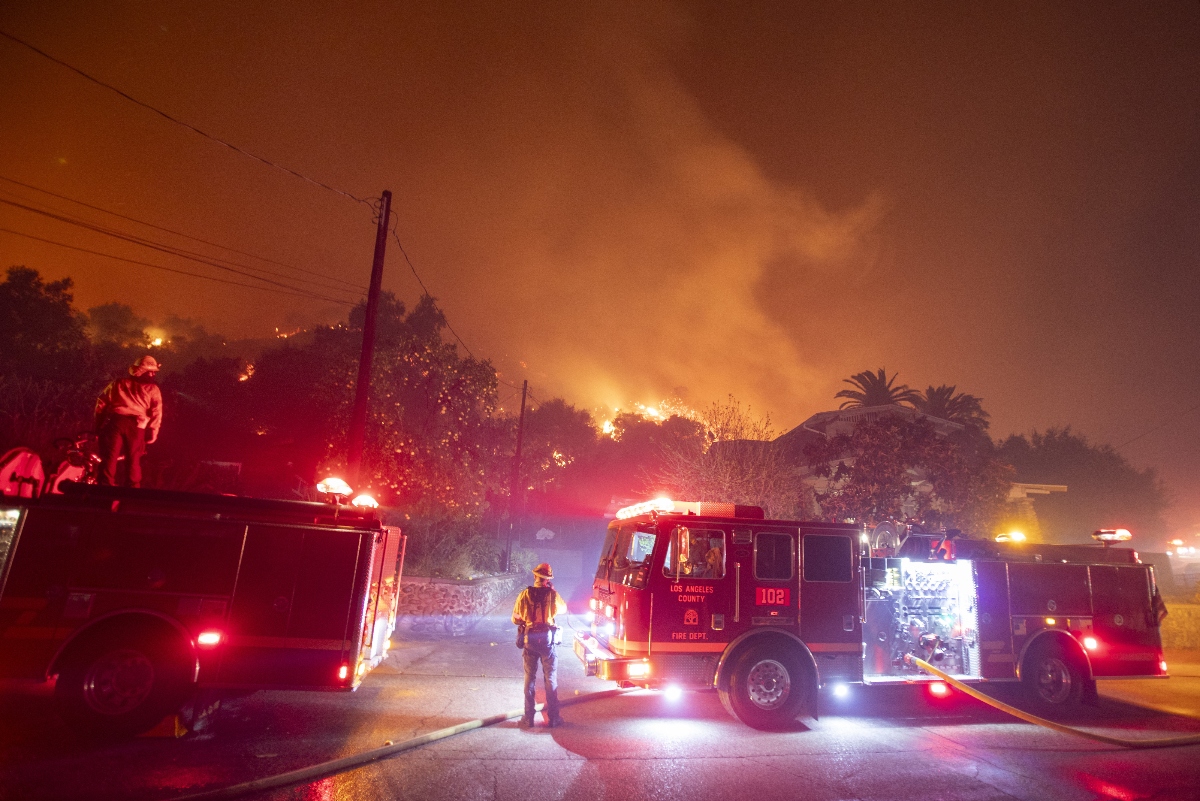Gambling On Calamity: Examining The Trend Of Betting On Events Like The Los Angeles Wildfires

Table of Contents
The Accessibility of Disaster Betting
The ease with which individuals can now engage in online gambling plays a significant role in the rise of betting on unpredictable events like natural disasters.
Online Betting Platforms and Their Role: The internet offers unparalleled access to numerous online betting platforms. While explicitly betting on specific natural disasters like the Los Angeles wildfires may not be openly advertised on mainstream platforms, the potential for such bets through less regulated international sites or through more obscure markets exists. This lack of stringent global regulation is a crucial factor. Anonymity offered by some platforms further complicates oversight and control.
- Examples: While specific examples of platforms offering direct bets on wildfires are difficult to publicly confirm due to the sensitivity and potential illegality, the existence of unregulated markets for niche and exotic betting events suggests this possibility.
- Lack of Regulation: Many jurisdictions lack comprehensive regulations covering this emerging form of gambling. This legal ambiguity creates a space for unscrupulous operators to thrive.
- Anonymity Concerns: The anonymity offered by many online platforms allows individuals to bet on catastrophic events without fear of immediate repercussions, further fueling the trend.
Social Media's Influence: Social media platforms have become breeding grounds for discussion and even community building around disaster betting. The viral nature of catastrophic events, coupled with the instant feedback loops of social media, amplifies this trend.
- Social Media Trends: Hashtags and discussions related to predicting or betting on disaster outcomes, while often veiled, can be found across various platforms.
- Influencer Culture: The reach of influencers and their potential to inadvertently normalize or even promote such betting behavior is a significant concern.
- Spread of Misinformation: The rapid spread of misinformation regarding the timing and severity of disasters can further fuel this dangerous form of speculation.
Ethical Concerns and the Commodification of Suffering
Betting on catastrophic events like the Los Angeles wildfires raises significant ethical concerns, fundamentally challenging our understanding of appropriate conduct in the face of human suffering.
The Moral Implications of Profiteering from Tragedy: The act of profiting financially from the devastation and loss experienced by others is profoundly morally questionable.
- Arguments Against: The practice is insensitive, exploitative, and deeply disrespectful to victims and their families.
- Psychological Impacts: For bettors, the act of profiting from such events can potentially desensitize individuals and contribute to a distorted moral compass.
- Comparison to Other Forms of Exploitative Gambling: Similar to other forms of exploitative gambling, this trend preys on human vulnerabilities and can lead to addiction and financial ruin.
The Victimization of Affected Communities: The existence of such bets adds another layer of hardship to those already reeling from the effects of disasters.
- Insensitivity: The very notion of betting on someone's suffering is profoundly insensitive and contributes to a culture of apathy.
- Impact on Recovery Efforts: The focus on financial gain rather than genuine support can detract from crucial recovery efforts.
- Potential for Exploitation: Vulnerable individuals affected by disasters could potentially be further exploited by those looking to profit from their circumstances.
Legal and Regulatory Challenges
The current legal frameworks are struggling to keep pace with the rapidly evolving landscape of online gambling, particularly concerning betting on catastrophic events.
Current Laws and Regulations: Existing gambling laws often focus on established forms of gambling like sports betting or casino games. The grey areas surrounding betting on unpredictable events like natural disasters necessitate a reassessment of legal frameworks.
- Existing Gambling Laws: Many jurisdictions have laws prohibiting certain forms of gambling, but these may not adequately address this new type of betting.
- Gaps in Regulations: Current regulations often fail to explicitly address or prohibit betting on natural disasters or other catastrophic events.
- International Variations: The lack of harmonized international regulations further complicates enforcement and control.
The Need for Stronger Regulation: There's a clear need for stricter regulations and increased oversight to curtail this emerging and ethically problematic form of gambling.
- Proposed Regulations: Governments should consider implementing specific legislation to prohibit or heavily restrict betting on catastrophic events.
- Role of Government Agencies: Regulatory bodies need to collaborate to effectively monitor and regulate online betting platforms operating within and across jurisdictions.
- International Collaboration: International cooperation is essential to combat the cross-border nature of online gambling activities.
The Psychology of Disaster Betting
Understanding the psychology behind betting on events like the Los Angeles wildfires is crucial to addressing the problem.
The Appeal of Predicting the Unpredictable: The human desire to predict the unpredictable is a powerful driver of this behavior.
- Thrill-Seeking Behavior: For some, the inherent risk and uncertainty associated with betting on catastrophic events may be a major attraction.
- Gambling Addiction: Individuals with gambling addictions might be particularly susceptible to this type of betting due to their pre-existing vulnerabilities.
- Cognitive Biases: Cognitive biases, such as overconfidence and confirmation bias, can lead individuals to overestimate their ability to predict such events.
The Role of Sensationalism and Media Coverage: Sensationalized media coverage of disasters can inadvertently fuel this trend.
- Responsible Reporting: Media outlets need to be mindful of the potential impact of their reporting and avoid sensationalizing catastrophic events in a way that encourages this form of betting.
- Ethics of Media Portrayal: The way disasters are portrayed in the media plays a significant role in shaping public perception and can influence the propensity of some individuals to bet on such events.
- Effect of Graphic Imagery: The use of graphic imagery can heighten the drama and potentially fuel the appeal of betting on such tragedies.
Conclusion
The rise of betting on catastrophic events, exemplified by the disturbing trend of betting on events like the Los Angeles wildfires, raises profound ethical, legal, and psychological questions. The ease of access through online platforms, amplified by social media, creates a concerning environment. The commodification of suffering is deeply troubling, and the current lack of robust regulation allows this exploitative practice to flourish. Understanding the psychological drivers behind such betting is crucial to developing effective strategies to combat it. We must actively support calls for stronger regulations and work towards a future where profiting from human tragedy is unacceptable. Let's collectively reject the normalization of betting on events like the Los Angeles wildfires and advocate for a more ethical and responsible approach to online gambling.

Featured Posts
-
 The Selection Of A New Pope An Inside Look At Papal Conclaves
Apr 22, 2025
The Selection Of A New Pope An Inside Look At Papal Conclaves
Apr 22, 2025 -
 American Protests Against Trump A Cross Country Overview
Apr 22, 2025
American Protests Against Trump A Cross Country Overview
Apr 22, 2025 -
 Google Vs Doj Back To Court Over Search Monopoly Concerns
Apr 22, 2025
Google Vs Doj Back To Court Over Search Monopoly Concerns
Apr 22, 2025 -
 Is The Razer Blade 16 2025 Worth It A Detailed Review Of Ultra Performance And Cost
Apr 22, 2025
Is The Razer Blade 16 2025 Worth It A Detailed Review Of Ultra Performance And Cost
Apr 22, 2025 -
 Statement On The Passing Of Pope Francis At 88
Apr 22, 2025
Statement On The Passing Of Pope Francis At 88
Apr 22, 2025
